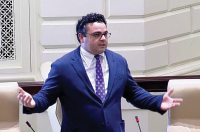August 28, 2024

Nearly two years after a new law created a pathway to provisional licensure for prospective speech-language pathologists, state regulators still have not implemented the law – and recent graduates of local colleges continue to stream to other states for employment, the law’s backers said.
“We have professionals that can help fix a gap in service. We train them here. They’re excited about being in Massachusetts. But they can’t stay without this provisional licensure regulation in place,” said state Sen. Nick Collins, who sponsored the bill that Gov. Charlie Baker signed into law in November 2022.
Asked about factors that have accounted for the slow-moving implementation of the law, a Department of Public Health spokesperson shared a timeline of the development of regulatory language – with the most recent entry dated Oct. 2, 2023, when the Board of Registration for Speech-Language Pathology and Audiology voted to move draft language forward.
The regulations have since been “elevated for administrative review and approval,” the spokesperson said. The next step will be a public comment period, expected to commence in the next couple of months.
Collins told the News Service he has not heard “any legitimate justification” for why the draft regulations have not been acted on, nearly a year since they were put forward by the board.
“We sent a letter to the Department of Public Health several months ago about this, ahead of the summer graduation timeline,” Collins told the News Service. “And we were just told that they’re not done yet.”
Speech-language pathologists treat patients with communications disorders. After graduating with a master’s degree in the field, prospective pathologists move into a clinical fellowship – but because they are not yet licensed, they cannot be reimbursed for services by insurance companies. The law provides for a temporary license valid for the duration of the supervised practice period.
Statutory language was on the docket for the Board of Registration’s December 2022 meeting, “various legal issues” were studied, and initial regulatory language was considered in March 2023, the DPH said, before additional changes were made. The DPH spokesperson did not address the cause of the 10-month gap that has elapsed since the October board vote on the matter.
The regulations were “pending agency and Secretariat approval” as of earlier this summer, according to the Board of Registration’s meeting minutes from June 2024.
An accounting of slow-moving bureaucracy may be of cold comfort to those like Lars Ebsworth of Malden, who expects to earn a master’s in speech-language pathology from Emerson College next year and wants to stay in the Bay State. He is one of several students who have sent letters to DPH Commissioner Dr. Robert Goldstein and HHS Secretary Kate Walsh urging action.
“While my program ends in August of 2025, the more we live in Massachusetts (almost one year now!), the more we are falling in love with New England. We would love to plant roots and start a life here,” Ebsworth wrote to Goldstein in a letter shared with the News Service.
“Since a hearing has yet to be scheduled following this bill being signed 16 months ago, and I would need to begin applying for clinical fellowships beginning in early 2025, I am increasingly worried that I will be forced to apply out-of-state to clinical fellowships since all 49 other states can offer a provisional state licensure for my field,” the former Maryland and Illinois resident wrote.
The status-quo lack of provisional licensure has led to a decrease in enrollment at all eight graduate-level speech path programs in Massachusetts, said Rick Branca, a former lobbyist who advocated for the bill’s passage in 2022.
“This issue causes a great imbalance and cost to our health care system and speech language pathologists. We are training, educating and providing for these speech pathologists at eight different universities and we lose every single one of them upon graduation because this law has not been implemented by the regulating body,” Branca said.
“The language is very self-explanatory and there are 49 other states who have regulatory language that was provided by the national association that our own regulatory body can use as a template to implement this law passed in November 2022,” Branca added.
The issue is personal for Collins, who overcame a stutter as a boy thanks to speech therapy and spent years shepherding the bill through the legislative process and working with the Speech-Language Hearing Association.
The cost of the delay? Another class of graduating speech language professionals who have moved on to other states, the South Boston Democrat said. “You know it’s been two years, and we think a lot of time has lapsed. And we can’t lose another class,” he said.


